AI Agentic SOC: The Next Evolution in Intelligent Security Operations
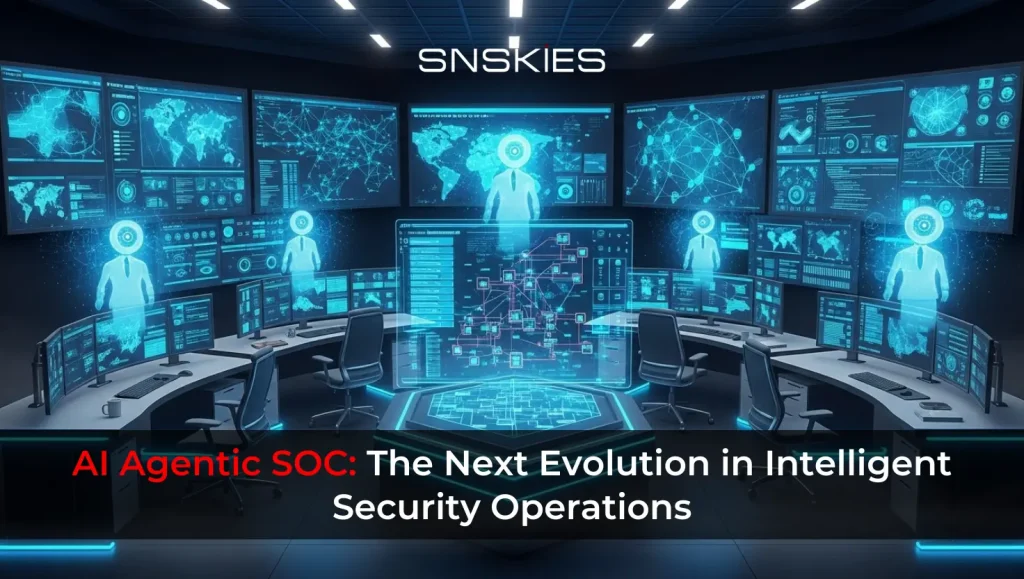
Articles What Is ZTNA? A Complete Guide to Zero Trust Network Access Explained Articles What Is ZTNA? A Complete Guide to Zero Trust Network Access Explained Articles November 6, 2025 In today’s cybersecurity landscape, speed and intelligence are everything. Threats evolve faster than ever before, and traditional Security Operations Centers (SOCs) struggle to keep pace. Enter the AI Agentic SOC — the next evolution in intelligent, autonomous, and adaptive cybersecurity. By combining the power of agentic AI with automated decision-making, businesses can achieve faster detection, smarter response, and stronger protection. Understanding AI Agentic SOC An AI Agentic SOC integrates AI-driven security operations with intelligent decision-making capabilities. Unlike traditional SOCs that rely on human analysts alone, an agentic SOC leverages AI agents to detect, investigate, and respond to cyber threats in real-time. These systems are designed to think, learn, and act autonomously, significantly reducing manual workload and response delays. This is what makes AI SOC automation a game-changer for enterprises seeking proactive defense mechanisms. Why Traditional SOCs Need a Transformation Traditional SOCs often depend on manual monitoring, leading to delayed responses and analyst fatigue. With rising cyber threats, the need for continuous visibility, automation, and adaptive intelligence has become vital. AI SOC analysts now use AI-powered SecOps tools that learn from patterns, anticipate potential attacks, and act before threats escalate ensuring organizations stay ahead of cybercriminals. The Power of Agentic AI in Security Operations Agentic AI SOC systems go beyond automation. They are capable of independent reasoning and adaptive response. These intelligent agents analyze complex data from multiple sources, determine the nature of potential threats, and execute mitigation protocols autonomously. Imagine having hundreds of digital analysts working 24/7 that’s what agentic AI delivers. It transforms AI in security operations from reactive monitoring to proactive prevention. Agentic AI Agents in Security Operations Agentic AI agents are designed to operate within security operations centers (SOCs) to enhance efficiency and accuracy. These agents can analyze logs, detect anomalies, and initiate remediation — all without human input. By learning continuously from past incidents, they enhance the performance of AI SecOps frameworks, making them smarter and more reliable over time. With AI SOC automation, these agents become the digital backbone of modern security infrastructure — ensuring that every incident, big or small, is addressed swiftly. Key Features of an AI Agentic SOC Autonomous Threat Detection: AI agents can identify anomalies across massive data sets within seconds. Continuous Learning: Machine learning algorithms improve response accuracy over time. Scalability: Easily expands with business growth and evolving threat landscapes. Seamless Integration: Works with existing Fortinet SecOps, firewalls, and endpoint security tools. Reduced Human Error: Automates repetitive tasks and minimizes manual oversight. Key Benefits of AI Agentic SOC for Businesses Faster Response Times: AI reduces detection-to-response time from hours to seconds. Cost Efficiency: Automation reduces dependency on large teams of analysts. Stronger Security Posture: AI’s predictive analytics identify threats before they occur. Improved Visibility: Continuous monitoring ensures full-spectrum coverage. Enhanced Compliance: Aligns with modern regulatory requirements through precise logging and tracking. AI-Powered SecOps: Transforming Cyber Defense AI-powered SecOps combines data analytics, automation, and real-time intelligence. By unifying detection and response, organizations can eliminate silos between IT and security teams. This integration allows AI SOC solutions to adapt dynamically to threats — creating the best security operations solution for businesses of all sizes. Security Operations Center Automation Automation lies at the heart of modern security operations center automation. From threat triage to remediation, AI reduces human workload while improving consistency. When combined with agentic AI SOC capabilities, businesses gain a resilient, always-on defense system capable of autonomous operation. Choosing the Best SOC Services for Cybersecurity When selecting the best SOC services for cybersecurity, businesses should focus on vendors that integrate agentic AI and automation. These solutions deliver real-time protection, enhanced visibility, and faster recovery from potential breaches. Solutions like SNSKIES AI Agentic SOC offer cutting-edge monitoring, advanced analytics, and seamless scalability — helping businesses stay secure in the era of AI-driven cyberattacks. The Future of AI in Security Operations The evolution of AI in security operations signals a future where human analysts and AI agents collaborate seamlessly. This hybrid model ensures higher precision, reduced response times, and optimized security workflows. With advancements in AI SecOps and Fortinet SecOps, the cybersecurity ecosystem will soon rely entirely on intelligent, self-learning systems. Conclusion The shift from traditional SOCs to AI Agentic SOCs represents the dawn of intelligent, adaptive, and autonomous cybersecurity. With agentic AI, organizations can finally overcome the limits of manual detection and delayed response. As cyber threats grow more complex, the integration of AI-powered SecOps becomes not just beneficial — but essential. Businesses ready to embrace this evolution will lead the next era of secure digital transformation. FAQs About Ai Agentic SOC What is an AI Agentic SOC? An AI Agentic SOC is a next-generation security operations center that uses autonomous AI agents for real-time threat detection, response, and prevention. How does AI improve SecOps efficiency? AI automates repetitive tasks, accelerates detection, and ensures accurate threat analysis reducing the burden on human analysts. What are the benefits of AI SOC automation? It enhances speed, accuracy, and scalability while reducing operational costs and minimizing human error. Is agentic AI replacing human analysts? No, agentic AI supports and augments analysts, allowing them to focus on strategic security decisions. Why choose SNSKIES for AI-powered security solutions? SNSKIES offers intelligent SOC solutions integrating agentic AI and automation to deliver proactive cybersecurity for modern enterprises. Recent Post All Posts Articles AI Agentic SOC: The Next Evolution in Intelligent Security Operations November 13, 2025/ AI SecOps: Redefining Security for the Digital Era November 12, 2025/ What Is ZTNA? A Complete Guide to Zero Trust Network Access Explained November 6, 2025/ Older Posts
AI SecOps: Redefining Security for the Digital Era
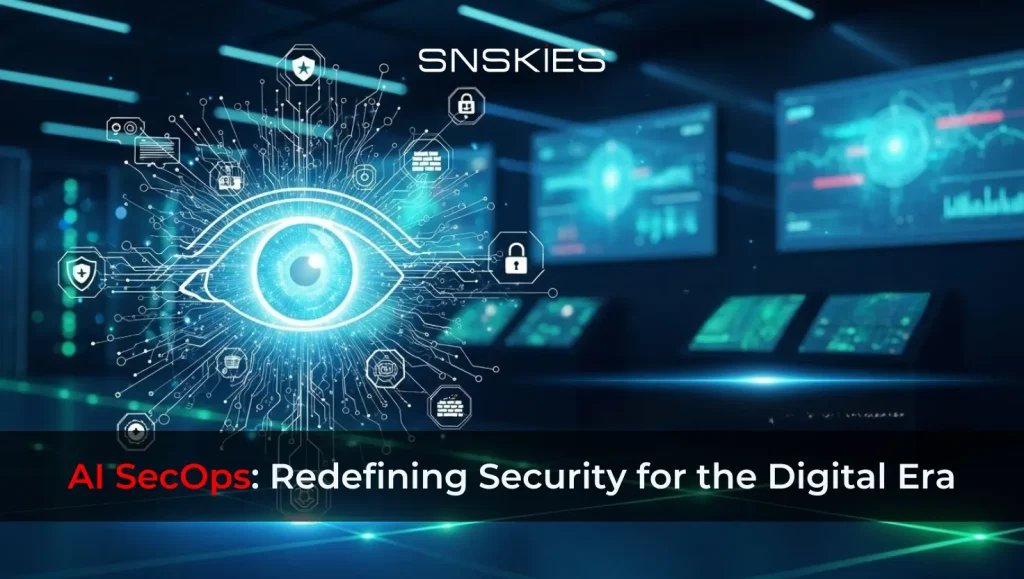
Articles SASE Solutions Explained: The Future of Cloud Security and Connectivity Articles SASE Solutions Explained: The Future of Cloud Security and Connectivity Articles November 3, 2025 As digital threats grow in complexity, AI SecOps (Artificial Intelligence for Security Operations) has emerged as a revolutionary approach to managing cybersecurity. Businesses today need more than manual monitoring—they need AI-powered SecOps that adapt, predict, and neutralize threats in real-time. Let’s explore how AI is shaping the future of intelligent security operations and why SNSKIES SOC services in Pakistan stand out as the leading solution for businesses. What Is Operation Security (OpSec)? Operation Security, or OpSec, is the process of protecting sensitive information from adversaries. It involves identifying critical data, analyzing threats, and taking proactive steps to safeguard digital assets. In the AI era, OpSec is evolving into AI-driven SecOps, where intelligent systems continuously learn from data to identify and mitigate risks faster than ever before. The Rise of AI in Security Operations Cyber threats are no longer static—they evolve dynamically. AI in security operations allows businesses to respond to threats before they escalate. With machine learning algorithms and automation, security teams can detect anomalies, predict attacks, and prioritize responses based on real-time risk analysis. This transition from reactive to proactive defense defines the AI SOC approach. Understanding AI SecOps and AI SOC AI SecOps integrates artificial intelligence with Security Operations Center (SOC) processes. This intelligent fusion enables faster detection, smarter decision-making, and more efficient operations. An AI SOC uses automation, data analytics, and machine learning to continuously monitor networks, detect vulnerabilities, and mitigate cyber incidents—ensuring constant vigilance for your digital environment. Why Traditional SOCs Are No Longer Enough Traditional SOCs rely heavily on human analysis, which can be time-consuming and error-prone. As the volume of data grows, manual monitoring becomes impractical. AI-powered SecOps enhances human intelligence by automating repetitive tasks, allowing analysts to focus on strategic response and advanced threat hunting. AI-Powered SecOps: Transforming Cyber Defense With AI SecOps, organizations can automate event correlation, anomaly detection, and even response actions. This shift enables real-time defense mechanisms that react instantly to suspicious activities. By integrating AI, businesses gain a self-learning SOC capable of adapting to emerging threats and minimizing downtime. Key Components of AI SecOps Threat Detection and Response AI identifies malicious patterns using predictive algorithms, reducing the risk of false positives and enabling immediate action. Automation in Security Operations Center (SOC) Security Operations Center automation streamlines workflows, allowing faster incident triage, ticketing, and mitigation—all with minimal human input. Machine Learning and Predictive Analysis Machine learning models within AI SOC continuously analyze threat intelligence to predict potential breaches before they occur. Benefits of AI in Security Operations Faster threat detection and response times Reduced operational costs with automation Improved accuracy through real-time analysis Scalability for organizations of all sizes Proactive defense against zero-day attacks How AI SecOps Improves Incident Response With AI-powered SecOps, incident response becomes predictive rather than reactive. AI-driven analytics identify anomalies in network behavior and suggest the most effective countermeasures—before damage occurs. Fortinet SecOps: Strengthening Security with AI Integration Fortinet SecOps combines next-gen firewall intelligence with AI automation, enabling seamless visibility across networks. By integrating with SNSKIES SOC solutions, businesses can leverage Fortinet’s AI capabilities for robust cybersecurity operations. AI SecOps for Businesses: A Smart Investment Businesses that adopt AI SecOps benefit from reduced breach risks, faster resolution, and improved compliance. In today’s digital world, this investment translates into long-term resilience and trust. Why Choose SNSKIES SOC Services in Pakistan SNSKIES offers one of the best Security Operations Center (SOC) services in Pakistan, delivering advanced AI-powered SecOps solutions tailored for enterprises. Their SOC is equipped with real-time monitoring, threat intelligence, and security operations center automation, ensuring uninterrupted business continuity. SNSKIES: Best SOC Services for Cybersecurity With 24/7 monitoring, expert analysts, and cutting-edge tools, SNSKIES provides the best SOC services for cybersecurity in Pakistan. Their AI-driven SOC enhances detection, automates responses, and strengthens your organization’s overall security posture. AI SOC and Security Operations Center Automation By merging AI and automation, SNSKIES transforms the traditional SOC into an intelligent security operations system—offering better visibility, reduced response time, and improved ROI for businesses of all sizes. Future of AI SecOps in the Cybersecurity Landscape The future of AI SecOps lies in continuous learning, cross-platform integration, and predictive defense. As cyber threats grow, AI will remain the cornerstone of advanced security operations—making intelligent SOCs the new norm for every business. Conclusion The digital battlefield is evolving—and so should your defense. AI SecOps is not just a trend; it’s the foundation of modern cybersecurity. With SNSKIES SOC services in Pakistan, businesses can experience intelligent, automated, and proactive protection that sets a new benchmark for security excellence. Ready to secure your business with AI-powered SOC? Contact SNSKIES today and experience the future of intelligent security operations. FAQs About AI SecOps What is AI SecOps? AI SecOps combines artificial intelligence and security operations to automate and enhance cybersecurity processes. How does AI SOC benefit businesses? AI SOC offers real-time threat detection, automation, and faster response times keeping your business protected 24/7. Why choose SNSKIES for SOC services? SNSKIES provides advanced AI-powered SOC solutions in Pakistan, ensuring intelligent monitoring and top-tier cybersecurity defense. What is security operations center automation? It automates tasks like incident detection, triage, and response, improving efficiency and accuracy in SOC operations. How does Fortinet SecOps integrate with AI? Fortinet SecOps uses AI-driven analytics for network protection, which, when combined with SNSKIES services, creates a powerful defense layer. Recent Post All Posts Articles AI SecOps: Redefining Security for the Digital Era November 12, 2025/ What Is ZTNA? A Complete Guide to Zero Trust Network Access Explained November 6, 2025/ SASE Solutions Explained: The Future of Cloud Security and Connectivity November 3, 2025/ Older Posts
What Is ZTNA? A Complete Guide to Zero Trust Network Access Explained
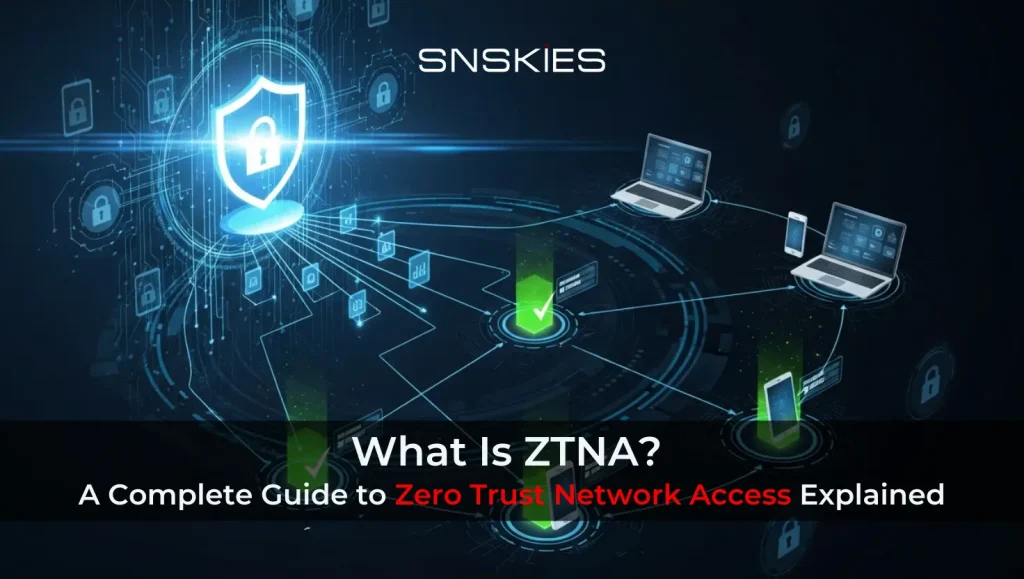
Articles AI-Driven Security Operations: The Future of Intelligent Threat Detection Articles AI-Driven Security Operations: The Future of Intelligent Threat Detection Articles October 30, 2025 In today’s evolving cybersecurity landscape, traditional defenses like VPNs are no longer enough to protect sensitive data. Cyber threats have grown more sophisticated, and the need for identity-based, least-privilege access is greater than ever. That’s where ZTNA (Zero Trust Network Access) comes in — a key part of the Zero Trust security model that protects organizations from internal and external threats. What Is ZTNA? What Is ZTNA or Zero Trust Network Access? In simple terms, ZTNA is a cybersecurity approach that assumes no user or device should be trusted by default — even if it’s inside the network. Instead, it verifies identity and context every time a user connects to an application or resource. This approach lets businesses enable remote work and cloud operations securely. Leading ZTNA vendors, like Snskies, provide advanced ZTNA services and ZTNA solutions that help companies implement Zero Trust effectively. How ZTNA Works Traditional networks grant broad access once users log in. ZTNA, however, enforces “never trust, always verify.” Each connection request goes through: Identity authentication (via SSO or MFA). Device posture checks. Context-aware authorization for specific applications. This identity-based access control reduces attack surfaces and limits exposure to potential threats. ZTNA vs VPN: The Key Differences When comparing ZTNA vs VPN, ZTNA provides stronger, more flexible protection: Granular Access: VPNs grant network-wide access; ZTNA limits users to approved apps. Scalability: ZTNA supports cloud and hybrid systems easily. Security: ZTNA eliminates lateral movement — a major VPN weakness. Because of these advantages, ZTNA is fast replacing VPNs as the new standard for secure remote access. ZTNA vs SASE: Understanding the Relationship You might wonder about ZTNA vs SASE. SASE ZTNA combines networking and security into one cloud-based framework. While SASE integrates multiple services like SD-WAN, CASB, and firewalls, ZTNA focuses on user and device access control within that ecosystem. Essentially, ZTNA is the identity-based foundation that makes SASE more secure and adaptable. ZTNA 2.0: The Next Generation of Zero Trust The term ZTNA 2.0 refers to the evolution of Zero Trust technologies. Unlike older models, ZTNA 2.0 continuously verifies users and context during every session. It adapts to new risks in real time and ensures continuous protection against dynamic cyber threats. snskies and other zero trust vendors are developing next-gen ZTNA solutions with AI-driven analytics and automated response capabilities. Best ZTNA Services for Identity-Based Access 2025 The best ZTNA services for identity-based access 2025 will focus on seamless integration, visibility, and automation. snskies leads in delivering scalable, cloud-native ZTNA platforms that provide secure, identity-driven access while improving performance and compliance. Which ZTNA Is Best for Limiting Exposure to Threats Wondering which ZTNA is best for limiting exposure to threats? The ideal solution offers deep visibility, adaptive authentication, and granular access policies. Top ZTNA vendors such as snskies, Palo Alto Networks, and Cloudflare use real-time analytics and AI to minimize risk and prevent unauthorized movement inside networks. What Is Cloudflare Zero Trust and What Is a Trust Network Understanding what is Cloudflare Zero Trust helps clarify how Zero Trust principles are applied in practice. Cloudflare Zero Trust enforces verification of every connection and encrypts all communications. Similarly, what is a trust network refers to a framework where security depends on continuous validation — not blind trust. Both concepts emphasize authenticated access, identity verification, and strong endpoint protection. Conclusion As cyber threats grow, adopting ZTNA solutions is essential for modern organizations. Whether transitioning from VPNs, integrating with SASE, or upgrading to ZTNA 2.0, implementing Zero Trust strengthens resilience and data protection. With trusted zero trust vendors like snskies, businesses can secure every user and device connection — minimizing risks and ensuring safe, identity-based access across all environments. FAQs About What is Ztna? What does ZTNA stand for? ZTNA stands for Zero Trust Network Access, a security model that restricts access based on verified user identity, device status, and context. How does ZTNA differ from a VPN? Unlike VPNs that give users broad network access, ZTNA limits access to specific applications, offering better security and scalability. Is ZTNA part of SASE? Yes. ZTNA is a core component of SASE (Secure Access Service Edge), focusing on secure, identity-based access control. What is ZTNA 2.0? ZTNA 2.0 is the next evolution of Zero Trust that continuously monitors user activity and adjusts trust levels dynamically. Who are the leading ZTNA vendors? Top ZTNA vendors include snskies, Cloudflare, Palo Alto Networks, and Zscaler, offering robust ZTNA services for secure remote and hybrid access. Why should businesses adopt ZTNA? ZTNA helps prevent unauthorized access, supports secure cloud adoption, and significantly reduces the risk of data breaches. Recent Post All Posts Articles What Is ZTNA? A Complete Guide to Zero Trust Network Access Explained November 6, 2025/ SASE Solutions Explained: The Future of Cloud Security and Connectivity November 3, 2025/ AI-Driven Security Operations: The Future of Intelligent Threat Detection October 30, 2025/ Older Posts
SASE Solutions Explained: The Future of Cloud Security and Connectivity
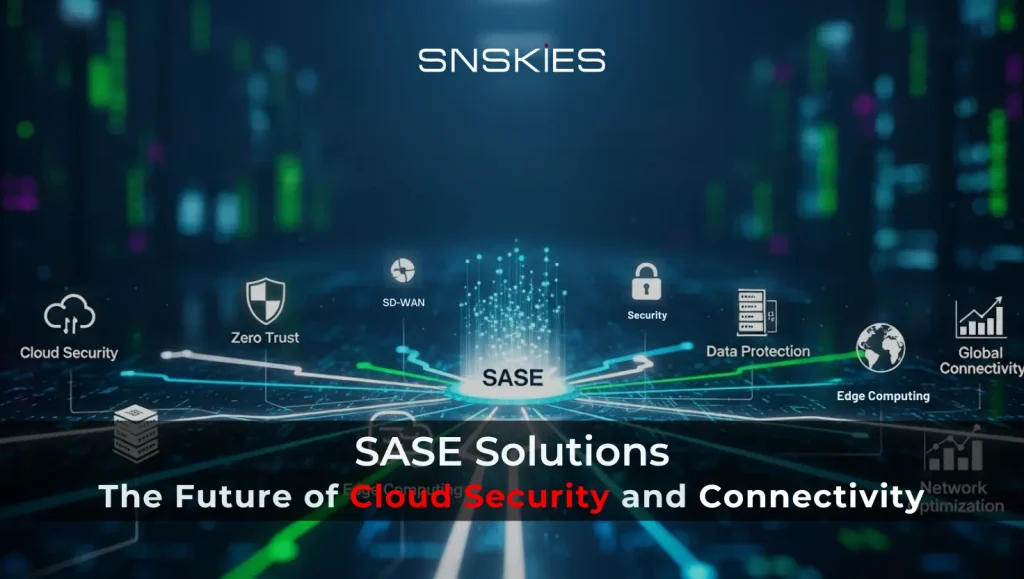
Articles Managed SD-WAN Services for Businesses Articles Managed SD-WAN Services for Businesses Articles October 29, 2025 In a world where cloud adoption and remote work are redefining how businesses operate, SASE Solutions (Secure Access Service Edge) have emerged as the backbone of secure and efficient digital transformation. By combining network security as a service and cloud-based connectivity, SASE unifies multiple security functions—like SD-WAN, CASB, SWG, ZTNA, and FWaaS—into one integrated architecture. Let’s dive into what makes SASE the future of cybersecurity and why organizations are adopting managed SASE to strengthen both security and performance. What Is SASE? So, what is SASE in simple terms? SASE (Secure Access Service Edge) is a cloud-native framework that integrates networking and security into a single service model. It delivers secure, optimized access to applications and data from any device, anywhere. In the context of cybersecurity, what is SASE in cyber security means combining software-defined networking (SD-WAN) with advanced security controls to ensure that data is protected, and users are verified before access is granted. Key Components of the SASE Architecture 1. Secure Web Gateway (SWG) The SWG (Secure Web Gateway) is a protective filter between users and the internet. It blocks access to harmful websites, prevents malware downloads, and stops phishing attacks. Acting as a web traffic guardian, it ensures users access only safe and authorized resources. 2. Cloud Access Security Broker (CASB) CASB (Cloud Access Security Broker) provides real-time monitoring and control over cloud applications. It enforces compliance and security policies, reduces data leakage risks, and enables safe cloud adoption. When integrated into a unified SASE environment, CASB becomes one of the top CASB solutions for maintaining data integrity across hybrid infrastructures. 3. Zero Trust Network Access (ZTNA) ZTNA works on the principle of “never trust, always verify.” It allows secure, identity-based access to resources, whether they are on-premises or in the cloud. Compared to VPNs, SASE vs ZTNA highlights ZTNA’s dynamic verification process, which significantly reduces the risk of unauthorized access. 4. Firewall-as-a-Service (FWaaS) FWaaS extends traditional firewall capabilities to the cloud. It inspects all traffic at the application layer and blocks potential threats. Being cloud-based, it scales easily and adapts to business needs, providing centralized security enforcement. 5. Software-Defined Wide Area Network (SD-WAN) SASE SD-WAN optimizes connectivity by routing traffic intelligently based on real-time performance metrics. It enhances user experience, minimizes latency, and ensures reliable connections—especially critical for distributed teams and remote work setups. 6. Centralized Management One of the biggest benefits of SASE is centralized management. Instead of juggling multiple security tools, SASE brings them under a single platform. This unified view allows easy monitoring, consistent policy enforcement, and simplified administration. Benefits of SASE Solutions The SASE benefits are far-reaching, offering both security and agility. Enhanced Security: Integrates ZTNA, CASB, and FWaaS for end-to-end data protection. Improved Performance: Optimized routing ensures fast, reliable access to cloud and SaaS applications. Scalability: Cloud-based architecture supports business growth without infrastructure strain. Cost Efficiency: Reduces dependency on multiple vendors and hardware investments. Visibility & Control: Offers granular insights into network and user activity through a centralized dashboard. Organizations seeking the best SASE solution for unified access can leverage these benefits to secure users and applications seamlessly—whether they’re in the office or on the move. What Is Security Service Edge (SSE)? Security Service Edge (SSE) is a subset of SASE that focuses purely on the security aspect—like SWG, CASB, and ZTNA—without the networking functions. SSE enhances SASE by strengthening visibility, access control, and compliance across hybrid and cloud environments. SASE vs SD-WAN While SD-WAN focuses mainly on improving network performance and connectivity, SASE combines those features with security layers. Essentially, SASE = SD-WAN + security functions like ZTNA, FWaaS, and CASB. This makes SASE the superior choice for businesses that need both speed and protection. SASE vs ZTNA ZTNA is a component within SASE. While ZTNA provides secure access through identity verification, SASE expands on this by combining ZTNA with network optimization, cloud access control, and firewall protection. So, ZTNA is the “who can enter,” while SASE decides “how and where they connect securely.” SASE and the Unified Client Agent (UCA) The Unified Client Agent (UCA) simplifies SASE deployment by combining multiple agents—like those for ZTNA, SWG, and SD-WAN—into one lightweight client. This reduces endpoint complexity and ensures consistent user protection across devices. SASE vs VPN Traditional VPNs create a single entry tunnel that can become a bottleneck and expose vulnerabilities. SASE, with its ZTNA and cloud-native design, verifies every user and device dynamically, offering stronger, more scalable protection. The comparison of SASE vs VPN clearly shows that SASE is built for modern, hybrid, and cloud-based infrastructures. Managed SASE Services Businesses are now opting for managed SASE to simplify implementation and management. Managed service providers deliver continuous monitoring, configuration, and threat intelligence, ensuring optimal performance and security without the complexity of in-house management. SASE and the Future of Cybersecurity As cyber threats grow more sophisticated, SASE solutions represent the evolution of network security as a service. They bridge the gap between performance and protection, empowering businesses to innovate securely in the cloud era. Adopting a managed SASE model enables organizations to future-proof their infrastructure while maintaining flexibility and compliance. FAQs About SASE Solutions What is SASE in cybersecurity? SASE integrates networking and security functions to deliver secure, cloud-based connectivity across distributed users and devices. What are the main benefits of SASE? SASE provides centralized security, scalability, cost savings, and improved performance through unified management. Is SASE the same as SD-WAN? No. SD-WAN enhances connectivity, while SASE combines SD-WAN with advanced security features like CASB and ZTNA. What is Security Service Edge (SSE)? SSE focuses on the security elements of SASE—like SWG, CASB, and ZTNA—without including SD-WAN. Why choose managed SASE? Managed SASE offers expert oversight, 24/7 monitoring, and hassle-free deployment for optimized cloud security. Recent Post All Posts Articles SASE Solutions Explained: The Future of Cloud Security and Connectivity November 3, 2025/ AI-Driven Security Operations: The Future of Intelligent Threat Detection October 30, 2025/ Managed SD-WAN Services for
AI-Driven Security Operations: The Future of Intelligent Threat Detection
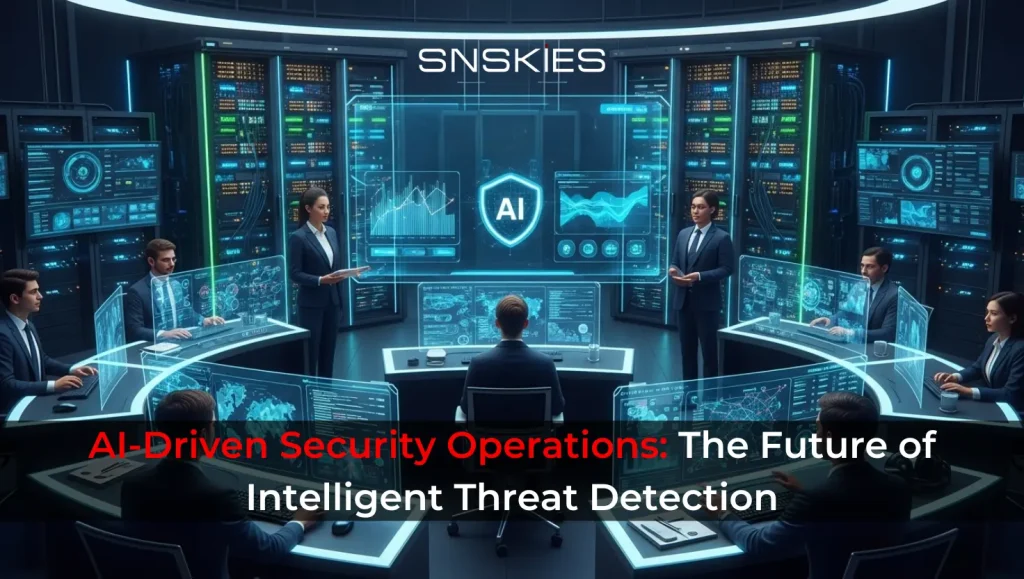
Articles Unlocking Business Potential with IT Infrastructure Solutions Articles Unlocking Business Potential with IT Infrastructure Solutions Articles October 14, 2025 Introduction: The Rise of AI in Cybersecurity In today’s fast-evolving threat landscape, traditional security operations can no longer keep up with the sophistication of modern cyberattacks. Enter AI-Driven Security Operations, a revolutionary approach combining artificial intelligence, automation, and analytics to detect, respond, and neutralize threats faster than ever. What Are AI-Driven Security Operations? AI-driven security operations (AI SecOps) integrate machine learning, automation, and data analytics into cybersecurity workflows. Unlike manual systems, these intelligent platforms continuously learn from network behavior, predict potential risks, and take proactive defense actions — all in real time. Understanding the Role of AI SOC An AI SOC (Security Operations Center) is the backbone of this modern defense model. It automates repetitive security tasks, correlates vast datasets, and accelerates incident response. By using AI SOC tools, organizations gain improved visibility, reduced false positives, and faster decision-making. AI SOC Analysts: Redefining Modern Defense The AI SOC analyst leverages automation and analytics to focus on strategic decision-making instead of manual log monitoring. With AI-driven insights, analysts can quickly identify anomalies, prioritize alerts, and coordinate faster responses, strengthening the overall security operations process. AI and Advanced Detection Analytics in Action AI and advanced detection analytics bring predictive intelligence to cybersecurity. These systems analyze millions of data points — from user behavior to network patterns — to detect hidden threats before they escalate. This proactive defense reduces downtime and minimizes the risk of breaches. How AI-Powered SecOps Transforms Cyber Defense AI-powered SecOps creates a seamless blend between automation and human expertise. By continuously learning from security events, AI models identify evolving attack patterns and trigger rapid responses. This reduces incident detection time and enhances overall network resilience. What is SOC Automation? SOC automation, or security operations center automation, uses AI to streamline workflows like incident triage, investigation, and response. Tasks that once took hours now happen in seconds, improving efficiency and reducing human error. Benefits of Security Operations Center Automation Faster Response Times – AI automates detection and containment. Reduced Workload – Analysts can focus on strategic decisions. Improved Accuracy – Automation minimizes false positives. Scalability – Easily adapts to growing network environments. Fortinet SecOps: Leading the Way in AI-Driven Defense Fortinet SecOps exemplifies innovation in AI-driven security operations. It integrates AI and machine learning with end-to-end visibility and automation to create a unified defense strategy. Businesses benefit from enhanced detection, predictive analytics, and continuous protection. The Evolution of SecOps in a Digital-First World Modern SecOps has evolved from reactive monitoring to proactive threat prevention. With cloud adoption, IoT expansion, and remote work, AI in network defense has become essential for protecting digital infrastructures against evolving cyber threats. AI in Network Defense: Smarter, Faster, Stronger The use of AI in network defense empowers organizations to detect anomalies instantly. Intelligent algorithms analyze network traffic, isolate suspicious activity, and trigger automated containment. This ensures business continuity and regulatory compliance. Why Businesses Need AI-Driven Security Operations Organizations face an increasing number of cyberattacks daily. AI-driven security operations ensure businesses stay ahead by providing predictive threat detection, automated incident response, and continuous monitoring — the pillars of modern cybersecurity resilience. Best SOC Services for Cybersecurity: Key Features When selecting the best SOC services for cybersecurity, consider: 24/7 monitoring and automated detection Threat intelligence integration AI-based response orchestration Real-time analytics and reporting SNSKIES: Empowering Businesses with AI-Powered SecOps SNSKIES delivers next-generation AI-driven security operations that combine automation, intelligence, and proactive threat management. With advanced AI SOC capabilities, SNSKIES helps organizations strengthen digital defense, reduce risk exposure, and ensure regulatory compliance — enabling smarter cybersecurity for a connected world. Conclusion: The Future is AI-Driven Security The future of cybersecurity lies in automation, intelligence, and adaptability. AI-driven security operations empower organizations to detect and respond faster, reducing risks before they impact business continuity. As threats evolve, AI ensures defense remains one step ahead. FAQs About AI-Driven Security Operations What is SOC automation in cybersecurity? SOC automation refers to using AI and machine learning to automate tasks like alert triage, threat analysis, and response actions. How does AI benefit security operations? AI improves speed, accuracy, and efficiency, allowing faster detection and resolution of security incidents. What is the role of an AI SOC analyst? An AI SOC analyst uses intelligent systems to monitor threats, analyze data, and enhance incident response strategies. What are the advantages of AI-powered SecOps? It provides real-time visibility, predictive analytics, and automated incident handling, reducing manual intervention. Why choose SNSKIES for AI-Driven Security Operations? SNSKIES offers advanced AI SOC and automation tools that protect businesses through intelligent, scalable, and secure cybersecurity solutions. Recent Post All Posts Articles Managed SD-WAN Services for Businesses October 29, 2025/ Best Server Storage Solutions | SNSKIES Network Storage & Data Management October 23, 2025/ Unlocking Business Potential with IT Infrastructure Solutions October 14, 2025/ Older Posts
Managed SD-WAN Services for Businesses
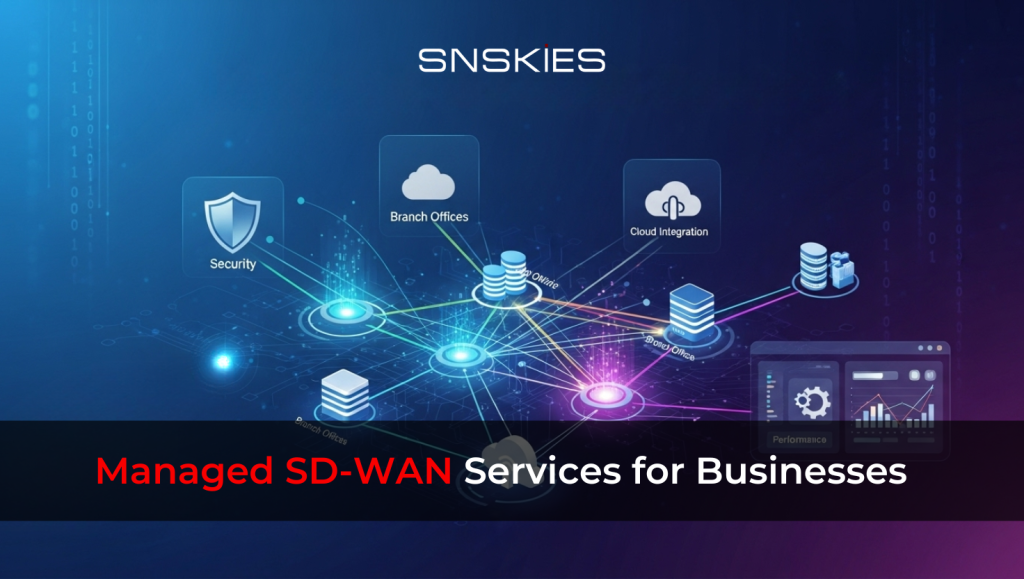
Articles Unlocking Business Potential with IT Infrastructure Solutions Articles Unlocking Business Potential with IT Infrastructure Solutions Articles October 14, 2025 In today’s hyperconnected world, businesses rely on agile, secure, and high-performing networks to maintain competitiveness. Traditional WAN architectures can no longer keep up with cloud-first operations, remote workforces, and growing cybersecurity threats. This is where managed SD-WAN services come in—revolutionizing enterprise networking with flexibility, intelligence, and centralized management. SNSKIES, a trusted managed SD-WAN provider in the Middle East, Pakistan, and KSA, empowers organizations with secure, fully managed connectivity that enhances performance while reducing operational complexity. What is SD-WAN? SD-WAN (Software-Defined Wide Area Network) is a technology that uses software-based controls to manage and optimize WAN connections across multiple sites. Instead of relying solely on MPLS, SD-WAN enables traffic routing through the most efficient and secure path—be it broadband, LTE, or fiber. By decoupling network hardware from its control mechanism, SD-WAN offers agility, cost efficiency, and real-time performance monitoring. Businesses adopting SD-WAN benefit from faster cloud access, better uptime, and reduced dependency on expensive infrastructure. What is Managed SD-WAN? Managed SD-WAN takes the complexity out of running your own network. It’s a service offered by managed SD-WAN providers like SNSKIES that handle the deployment, monitoring, and maintenance of your SD-WAN infrastructure. With fully managed SD-WAN, businesses get 24/7 network oversight, automated updates, and built-in security policies—without the need for internal IT management. This managed approach ensures scalability, reliability, and continuous optimization of application performance across all business locations. SD-WAN as a Managed Service: Simplifying Modern Networking SD-WAN as a managed service combines the flexibility of SD-WAN with the convenience of professional management. Businesses can focus on growth while experts handle connectivity, configuration, and cyber security. This model offers: Centralized visibility and control. Dynamic path selection for optimized traffic. End-to-end encryption for secure data transmission. Seamless integration with cloud-managed tools and security systems. SNSKIES delivers cloud-managed SD-WAN solutions tailored for enterprises seeking consistent and secure connectivity across regions. Why Do Businesses Need Managed SD-WAN? Modern enterprises need networks that adapt quickly to evolving demands. Managed SD-WAN services empower organizations with: Enhanced performance for SaaS and cloud-based apps. Zero-touch provisioning for easy setup and scalability. Advanced security with integrated threat detection and encryption. Cost efficiency through optimized bandwidth usage. Business continuity with automated failover and resilience. Whether you operate in Pakistan, the Middle East, or KSA, SNSKIES ensures your WAN remains robust, intelligent, and secure—meeting both business and regulatory needs. Who Offers the Most Superior SD-WAN in Networking and Cybersecurity? In the competitive landscape of network solutions, SNSKIES stands out as one of the most superior SD-WAN providers. With expertise in cybersecurity and enterprise-grade connectivity, SNSKIES integrates managed SD-WAN with advanced security frameworks, including next-generation firewalls and AI-driven threat intelligence. This fusion of networking and security ensures that businesses not only gain fast and stable connections but also remain protected against evolving cyber threats. What Is the Difference Between Managed SD-WAN and SD-WAN as a Service? While both deliver network efficiency and control, there’s a subtle distinction: Managed SD-WAN involves a third-party provider (like SNSKIES) managing, configuring, and maintaining the SD-WAN infrastructure on behalf of the business. SD-WAN as a Service (SDWaaS), on the other hand, delivers SD-WAN entirely through the cloud, where the infrastructure is hosted and delivered as a service model. In short, managed SD-WAN provides personalized management and support, while SD-WAN as a Service offers a fully cloud-native experience. What Are the Pros and Cons of Managed SD-WAN? Pros: Simplified network management. Lower IT overhead and maintenance. Enhanced visibility and analytics. Continuous optimization and performance tuning. Built-in security compliance. Cons: Dependence on the service provider’s expertise. Limited customization in some managed plans. Potential vendor lock-in if migration flexibility isn’t addressed early. However, providers like SNSKIES ensure businesses experience minimal downsides with flexible, transparent, and scalable managed SD-WAN packages. The Future of Networking: Cloud-Managed SD-WAN The rise of cloud-managed SD-WAN represents the next step in intelligent networking. It enables centralized policy management, automated traffic routing, and direct integration with leading cloud services like AWS and Azure. SNSKIES helps enterprises migrate from traditional WANs to cloud-first architectures seamlessly, ensuring future-ready, secure, and scalable connectivity. Conclusion In a world driven by digital transformation, managed SD-WAN services offer businesses an intelligent, secure, and performance-oriented network backbone. With SNSKIES as your technology partner in Pakistan, the Middle East, and KSA, you gain the advantage of a fully managed, cyber-resilient SD-WAN solution tailored to your business needs. Whether you’re upgrading from legacy systems or expanding globally, managed SD-WAN ensures your network is as dynamic as your business growth. FAQs on Managed SD-WAN Services What is managed SD-WAN? Managed SD-WAN is a service where a third-party provider handles deployment, monitoring, and management of your SD-WAN infrastructure for optimized connectivity and security. What is the difference between managed SD-WAN and SD-WAN as a Service? Managed SD-WAN involves provider management of your network hardware and configuration, while SD-WAN as a Service delivers networking entirely through a cloud-hosted model. Why do businesses need managed SD-WAN? Because it offers improved performance, centralized control, enhanced security, and lower IT costs compared to traditional WANs. Who offers the most superior SD-WAN in networking and cybersecurity? SNSKIES is among the leading managed SD-WAN providers, combining robust networking with advanced cybersecurity solutions for enterprises. What are the pros and cons of managed SD-WAN? The pros include simplified management and strong security, while the cons involve dependency on the provider’s expertise and potential customization limits. Recent Post All Posts Articles Managed SD-WAN Services for Businesses October 29, 2025/ Best Server Storage Solutions | SNSKIES Network Storage & Data Management October 23, 2025/ Unlocking Business Potential with IT Infrastructure Solutions October 14, 2025/ Older Posts
Best Server Storage Solutions | SNSKIES Network Storage & Data Management
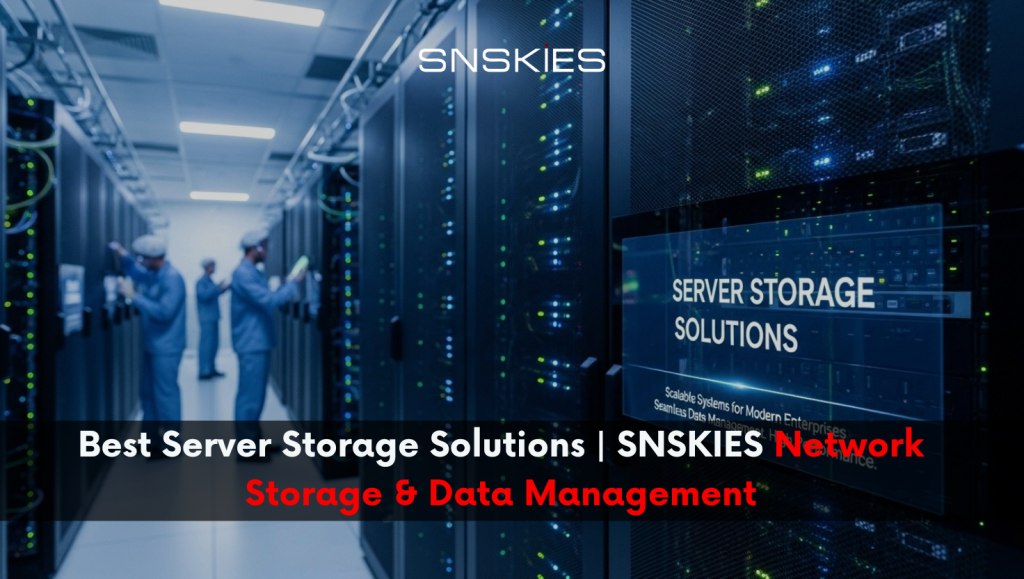
Articles ZTNA Services in KSA | Secure Remote Access for Saudi Businesses Articles ZTNA Services in KSA | Secure Remote Access for Saudi Businesses Articles October 13, 2025 In today’s fast-paced digital world, businesses need reliable, secure, and scalable server and storage solutions to manage growing volumes of data. From small enterprises to large corporations, choosing the right storage server plays a critical role in ensuring smooth operations, enhanced productivity, and business continuity. Why Server and Storage Solutions Matter Modern businesses depend on server and storage solutions to securely store, manage, and retrieve critical business data. Unlike traditional storage systems, today’s advanced server storage options provide fast access to data, minimize downtime, and enable smooth collaboration across teams. This is particularly crucial for organizations operating in data-intensive industries such as finance, healthcare, retail, and technology. A well-designed storage and backup strategy protects businesses against data loss, system failures, and cyber threats. Whether it’s daily operations, disaster recovery, or secure cloud integration, the right infrastructure makes a real difference. SNSKIES — A Trusted Server and Storage Provider in Pakistan When it comes to reliable server and storage solutions in Pakistan, SNSKIES stands out as a trusted partner for businesses of all sizes. The company offers end-to-end solutions tailored to meet the specific needs of each organization. From on-premises storage servers to hybrid and cloud-based infrastructures, SNSKIES delivers unmatched performance, security, and scalability. SNSKIES specializes in best server storage solutions that are not only cost-effective but also future-ready. Their expert team ensures seamless deployment, smart data management, and 24/7 support—allowing businesses to focus on growth without worrying about storage failures. The Role of Storage and Backup in Business Continuity Data is the backbone of modern enterprises. A single outage or system compromise can result in significant financial and reputational damage. This is why having a robust storage and backup system is essential. With advanced data storage management, businesses can automate data handling, improve accessibility, and reduce risks associated with manual errors. SNSKIES integrates advanced technologies that support disaster recovery, real-time data replication, and secure backup systems to ensure business continuity. Network Storage Server: The Future of Data Management The rise of hybrid and remote work has increased the demand for network storage servers. Unlike traditional storage solutions, network-based storage allows multiple users to access and manage data from anywhere, enabling seamless collaboration and improved operational efficiency. SNSKIES provides secure and high-performance network storage server solutions designed to support the evolving needs of modern businesses. Whether you require shared storage for your team or an enterprise-grade solution, SNSKIES ensures maximum uptime, strong security, and flexible scalability. Why Choose SNSKIES for Server and Storage Solutions Choosing the right technology partner is as important as choosing the right technology itself. SNSKIES combines years of expertise with innovative infrastructure to deliver reliable server and storage solutions. Here’s why businesses in Pakistan and beyond trust SNSKIES: Customized solutions tailored to your business needs High-performance storage servers with advanced security features Real-time monitoring and proactive support Scalable data storage management for growing businesses Cost-effective deployment with flexible upgrade options Conclusion In a world where data powers every decision, having robust server and storage solutions is essential. SNSKIES provides modern, secure, and scalable network storage server solutions that help businesses thrive in a competitive digital landscape. Whether you need advanced data storage management or seamless storage and backup integration, SNSKIES ensures your business stays secure, agile, and future-ready. Invest in the best server storage solutions today and let SNSKIES be your trusted partner in building a reliable digital foundation for your business in Pakistan. Recent Post All Posts Articles Best Server Storage Solutions | SNSKIES Network Storage & Data Management October 23, 2025/ Unlocking Business Potential with IT Infrastructure Solutions October 14, 2025/ ZTNA Services in KSA | Secure Remote Access for Saudi Businesses October 13, 2025/ Older Posts
Unlocking Business Potential with IT Infrastructure Solutions
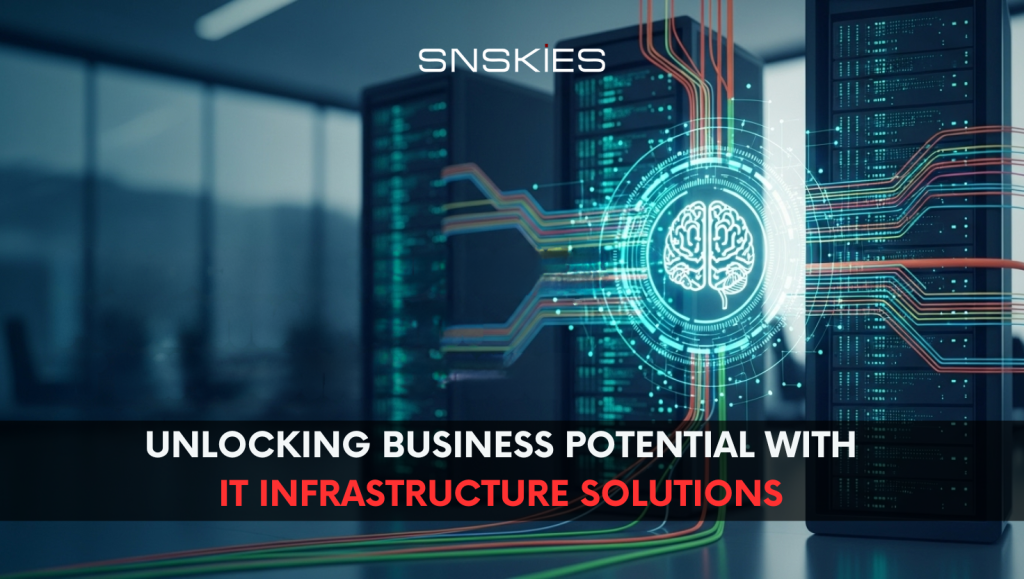
Articles What is ZTNA? SNSKIES Guide to Zero Trust Application Access Articles What is ZTNA? SNSKIES Guide to Zero Trust Application Access Articles October 9, 2025 Businesses today depend on strong IT infrastructure solutions for efficiency, innovation, and growth. These solutions cover hardware, software, networks, and services to support tech ecosystems, including cloud, data centers, and cybersecurity for continuity and scalability. What Are IT Infrastructure Solutions? IT infrastructure handles data storage, processing, and transmission. Solutions optimize components like servers, storage, networking, and virtualization. Hybrid models mix on-premises with clouds like AWS, Azure, or Google Cloud. Small firms use basic setups; enterprises apply SDN or Docker/Kubernetes for scalability. Microsoft used Azure and AI for hybrid work adaptation. A transportation firm on AWS boosted efficiency 80% and cut costs 30%. Security features like firewalls and encryption address threats, ensuring GDPR/HIPAA compliance. The Benefits of Implementing Advanced IT Infrastructure Solutions Solutions improve performance by cutting latency, enhancing customer experiences. Edge computing speeds e-commerce delivery. Cloud models reduce costs 30-40% via pay-as-you-go, with automation freeing teams for innovation. Eco-designs like renewable energy cut carbon footprints. A goods company used cloud/IoT for efficient, green supply chains. Key Types of IT Infrastructure Solutions Hardware: Servers and storage for reliability. A sportswear brand merged ops with ERP for agile experiences. Software: OS, databases, tools; open-source like Linux for affordability. Network: Switches and SD-WAN for bandwidth optimization. Cloud/Hybrid: Agile blends for finance data needs. A telecom app gained 200,000 users via microservices. Security: Detection tools. A firm cut tickets 15% with CRM integration. Tailor via experts based on size and goals. Emerging Trends in IT Infrastructure Solutions AI predicts issues; an energy firm uses digital twins for safety. Edge cuts latency for IoT; 5G aids remote work. Green IT and zero-trust enhance efficiency and security. A fashion brand scaled supply chains with platforms. How to Choose the Right IT Infrastructure Solutions Audit systems, engage stakeholders for alignment. Partner with Cisco/Dell for scalable support. Budget total costs; pilot for ROI validation. Train staff: A pharma sped R&D 30-40% with AI; a clinic streamlined workflows via EHR. Future-Proofing Your Organization with IT Infrastructure Solutions IT solutions offer agility, cost savings, and growth. They turn challenges into innovation opportunities. Consult experts for insights. FAQs About SD-WAN Service Providers What is IT infrastructure? IT infrastructure includes the hardware, software, networks, and facilities that support data management and business operations, forming the backbone of modern technology ecosystems. What are the main benefits of IT infrastructure solutions? They enhance efficiency, reduce costs through scalable models, improve security against threats, and support innovation by enabling faster data processing and better resource allocation. What is the difference between traditional and cloud-based IT infrastructure? Traditional infrastructure relies on on-premises hardware like physical servers, while cloud-based uses remote, scalable services from providers like AWS or Azure, offering flexibility and lower upfront costs. How do I know if my business needs to upgrade its IT infrastructure? Signs include frequent downtime, slow performance, high maintenance costs, or inability to support growth. Conduct an audit to identify bottlenecks and consult experts for recommendations. What role does security play in IT infrastructure solutions? Security is integral, with features like firewalls, encryption, and zero-trust models protecting against cyber threats. Regular updates and compliance with standards like GDPR ensure data safety. Should I consider outsourcing IT infrastructure management? Yes, if your in-house team is overwhelmed or lacks expertise. Outsourcing provides 24/7 support, cost savings, and access to advanced tools, but evaluate providers for reliability and risk management. What are emerging trends in IT infrastructure? Key trends include AI-driven automation, edge computing for low-latency IoT, 5G connectivity, and sustainable green IT practices to reduce environmental impact. Recent Post All Posts Articles Unlocking Business Potential with IT Infrastructure Solutions October 14, 2025/ ZTNA Services in KSA | Secure Remote Access for Saudi Businesses October 13, 2025/ What is ZTNA? SNSKIES Guide to Zero Trust Application Access October 9, 2025/ Older Posts
ZTNA Services in KSA | Secure Remote Access for Saudi Businesses
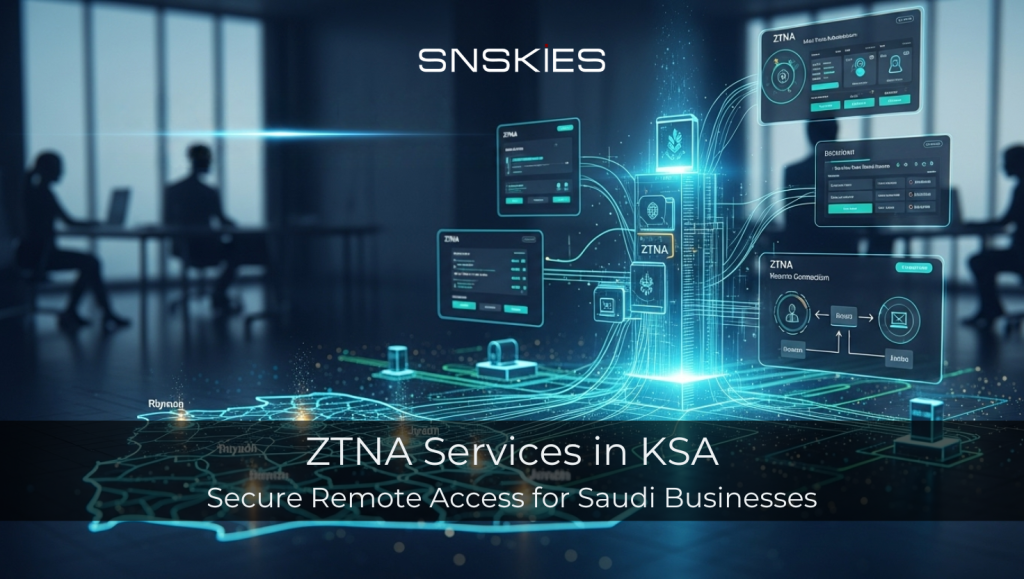
Articles Cybersecurity as a Service: The Smarter Way to Protect Your Business in 2025 Articles Cybersecurity as a Service: The Smarter Way to Protect Your Business in 2025 Articles October 7, 2025 Introduction As Saudi Arabia rapidly advances its digital transformation under Vision 2030, cybersecurity has become a strategic priority for organizations across the Kingdom. With the rise of remote work, cloud adoption, and modern IT infrastructures, traditional security tools like VPNs no longer provide the level of protection businesses need. This is where Zero Trust Network Access (ZTNA) steps in. Unlike conventional VPNs, ZTNA continuously verifies every user, device, and connection before granting access, ensuring that trust is never assumed. For enterprises in KSA, adopting advanced ZTNA solutions is no longer optional it’s a necessity to maintain secure remote access and protect sensitive data. What is Zero Trust Network Access (ZTNA)? Zero Trust Network Access (ZTNA) is a security model built on the principle of “never trust, always verify.” Instead of giving users unrestricted access once logged in, ZTNA enforces identity-based and context-aware policies for every session. By applying strong authentication and segmentation, ZTNA solutions limit access to only specific applications and services. This prevents cybercriminals from moving laterally across networks, reducing the risk of breaches and ensuring more robust data protection. For Saudi enterprises, this approach is ideal for hybrid environments—whether on-premise, in the cloud, or both—ensuring secure and controlled access at every level. ZTNA vs VPN: Why It Matters for Saudi Businesses VPNs have long been used as the default method for secure remote access, but they come with serious limitations. A VPN often grants broad network access, increasing the attack surface and making it difficult to enforce granular security controls. ZTNA vs VPN comparisons clearly show why businesses in KSA are shifting to Zero Trust Network Access. Unlike VPNs, ZTNA provides: Application-specific access instead of full network exposure Strong user and device verification Real-time visibility into sessions and access patterns Adaptive security controls to counter modern threats For industries such as finance, oil & gas, and healthcare where protecting critical data is non-negotiable ZTNA is the smarter and safer choice. ZTNA Solutions for Saudi Enterprises Modern ZTNA providers offer robust security features, making adoption simple and scalable for Saudi organizations. By integrating SASE ZTNA (Secure Access Service Edge) frameworks, enterprises gain centralized visibility, continuous monitoring, and simplified IT operations. A powerful example is FortiGate ZTNA, which combines firewall, secure access, and zero trust capabilities into a single, integrated platform. With FortiGate ZTNA, organizations can build secure remote access without replacing their entire infrastructure. These ZTNA solutions give Saudi businesses the flexibility to scale, protect users from anywhere, and stay compliant with evolving regulations. How ZTNA Protects KSA Businesses Saudi businesses face rising threats like phishing, ransomware, and insider attacks. ZTNA services in KSA help organizations build a secure digital perimeter with multiple protection layers: Application-specific access instead of broad network entry Strong identity verification for users and devices Continuous monitoring to detect abnormal activity Easy integration with cloud, on-premise, and hybrid environments Support for regulatory compliance and secure remote work With Zero Trust Network Access, enterprises can reduce the risk of breaches, minimize downtime, and maintain business continuity. SNSKIES Trusted ZTNA Provider in Saudi Arabia SNSKIES is a leading cybersecurity company delivering ZTNA solutions designed specifically for Saudi businesses. Our experts work closely with enterprises to design, implement, and manage customized Zero Trust architectures. By integrating SASE ZTNA frameworks and FortiGate ZTNA technology, SNSKIES helps organizations achieve: Advanced data protection and threat prevention Simplified IT and security management Full compliance with Saudi cybersecurity regulations Secure access for remote and on-site teams Seamless scalability as the business grows With years of experience and a proven track record, SNSKIES stands out among top ZTNA providers in KSA, ensuring secure and resilient network access for the digital future. Conclusion In a fast-evolving cyber landscape, traditional VPN solutions are no longer enough to protect sensitive data and business operations. Zero Trust Network Access (ZTNA) provides a smarter, more secure alternative for Saudi organizations. By adopting advanced ZTNA solutions from trusted ZTNA providers like SNSKIES, businesses in KSA can secure remote access, strengthen their defenses, and stay ahead of evolving threats. With powerful platforms like FortiGate ZTNA and the flexibility of SASE ZTNA, enterprises can build a modern, scalable, and secure network infrastructure. Zero Trust isn’t just a framework—it’s the foundation of future-ready cybersecurity in Saudi Arabia FAQs About ZTNA Services What is Zero Trust Network Access (ZTNA) and why is it important for KSA businesses? ZTNA ensures that only verified users and trusted devices can access specific applications, reducing the risk of data breaches. How is ZTNA better than VPN for remote workers in Saudi Arabia? Unlike VPNs that give broad access, ZTNA provides granular, application-specific access, minimizing security risks. Which industries in KSA benefit most from ZTNA solutions? Sectors like finance, oil & gas, government, and healthcare benefit the most due to handling highly sensitive information. Can ZTNA integrate with existing IT infrastructure in Saudi enterprises? Yes. Leading ZTNA providers like SNSKIES support seamless integration with on-premises, cloud, and hybrid environments. What is SASE ZTNA, and how does it support Saudi businesses? SASE ZTNA combines networking and security capabilities to protect remote users and branch offices with a single, unified approach. Why choose SNSKIES for ZTNA services in KSA? SNSKIES delivers tailored ZTNA solutions, leveraging FortiGate ZTNA and SASE frameworks to enhance security, compliance, and operational efficiency. Recent Post All Posts Articles ZTNA Services in KSA | Secure Remote Access for Saudi Businesses October 13, 2025/ What is ZTNA? SNSKIES Guide to Zero Trust Application Access October 9, 2025/ Cybersecurity as a Service: The Smarter Way to Protect Your Business in 2025 October 7, 2025/ Older Posts
What is ZTNA? SNSKIES Guide to Zero Trust Application Access
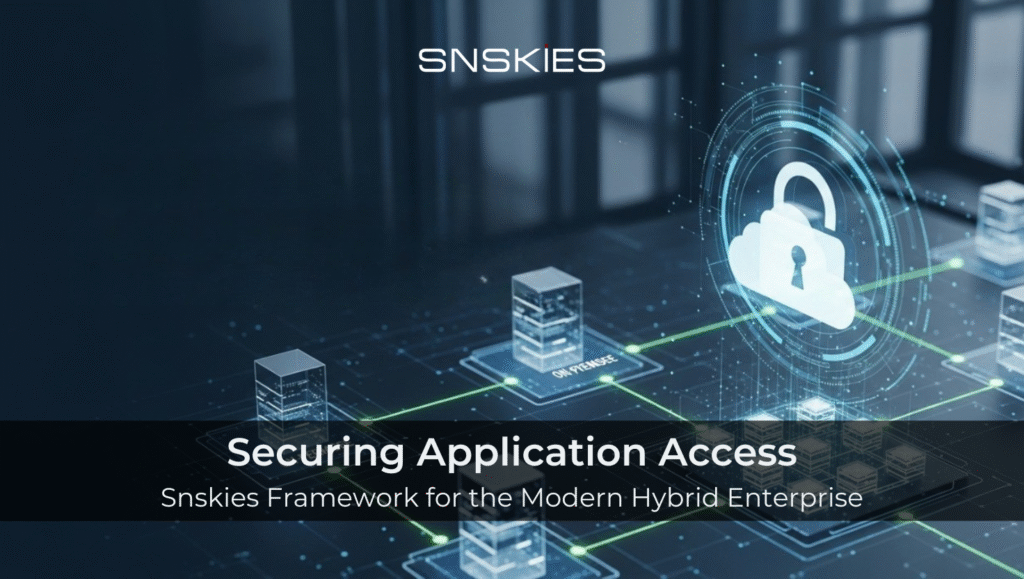
Articles CASB Solution | Next-Gen Cloud Security & Access Control Articles CASB Solution | Next-Gen Cloud Security & Access Control Articles September 30, 2025 Securing Application Access: SNSKIES Framework for the Modern Hybrid Enterprise The Evolution to Application-Centric Security The exponential growth of the distributed workforce has fundamentally redefined the corporate security perimeter. Employees now access critical business applications hosted across data centers and various cloud environments from numerous non-traditional locations. Relying on legacy Virtual Private Networks (VPNs) is no longer viable, as they grant broad, implicit network access that dramatically expands the attack surface. The definitive solution is Zero Trust Network Access (ZTNA). ZTNA implements the core philosophy of “never trust, always verify,” establishing highly granular, context-aware security policies that connect users directly to the specific applications they need, based on verified identity and device compliance. The Zero Trust Framework: Snskies Approach to Granular Control Snskies designs and deploys next-generation access solutions that pivot security from network trust to explicit verification. Our framework ensures access is consistently applied across all users, whether they are working in the office or remotely. The core of this architecture relies on tightly integrated components that replace broad network access with secure, segmented application tunnels: Application Access Gateway: This intelligent enforcement point acts as an intermediary, hiding private applications from the internet and brokering secure, encrypted sessions. Continuous Device Posture Check: A lightweight endpoint agent constantly assesses the user’s device, verifying its security compliance (e.g., encryption status, patching levels) in real-time. Unified Policy Engine: This engine correlates user identity, verified through multi-factor authentication, with the device’s posture to make a dynamic access decision. Snskies leverages the powerful and highly scalable platform technology developed by our trusted partner, Fortinet, to deliver this unified ZTNA control. This architectural strategy eliminates lateral movement risk, as access is restricted to the specific, authorized application and is continuously re-verified throughout the user’s session. Strategic Business Benefits By deploying Snskies ZTNA solution, organizations realize immediate and long-term strategic advantages: Significant Risk Reduction: The attack surface is minimized because users are only granted least-privilege access to necessary applications, not the entire corporate network. Enhanced User Experience: Employees benefit from a seamless and “always-on” connection that is superior to traditional remote access methods, supporting higher productivity and collaboration. Operational Simplicity: Centralized management of policies across the security platform simplifies administration, ensures consistent governance, and streamlines security audit processes. Future-Proofing: This ZTNA foundation is fully scalable and aligns with the requirements of a modern Secure Access Service Edge (SASE) architecture, positioning the enterprise for future security convergence. Conclusion Adopting Universal Zero Trust Access is a critical step in securing the modern digital landscape. By implementing this advanced framework, organizations can confidently protect their most valuable applications while simultaneously empowering their hybrid workforce with secure, frictionless connectivity. Recent Post All Posts Articles Securing Application Access: SNSKIES Framework for the Modern Hybrid Enterprise October 9, 2025/ Cybersecurity as a Service: The Smarter Way to Protect Your Business in 2025 October 7, 2025/ CASB Solution | Next-Gen Cloud Security & Access Control September 30, 2025/ Older Posts